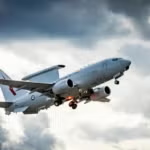
Raytheon [RTN], fresh off its victory over incumbent Boeing [BA] to win the Air Force’s $298 million Family of Advanced Beyond Line-of-Sight Terminals (FAB-T) deal, is preparing for the execution of the production contract, according to a company executive. Raytheon Vice President for Integrated Communication Systems Scott Whatmough told reporters Thursday the company has finished the design and manufacturing of the low-rate initial production (LRIP) configuration of the command post terminals (CPT). There are two LRIP periods, Whatmough said, followed…













